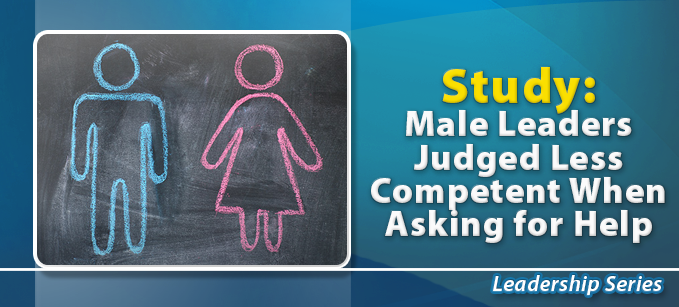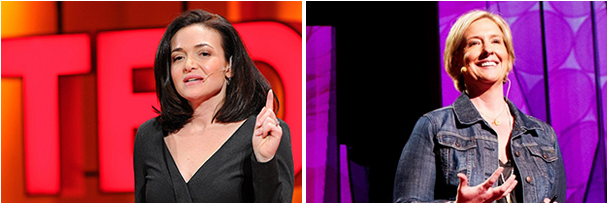Study: Male Leaders Judged Less Competent When Asking for Help

Research published in The Leadership Quarterly sheds light on why men may have such an aversion to asking for directions: they suffer from being perceived as less competent — by both other men and women.

The new research presents an interesting flip side to several recent studies that have gained attention in the business media from examining negative biases towards women. Just as women might be perceived as “bossy” when they engage in assertive or “masculine” behaviours — a bias addressed most notably by Sheryl Sandberg in her #banbossy campaign — male leaders can also be judged unfavourable if they engage in more “feminine” behaviours.
There were two studies conducted by the researchers at Duke University who noted that “seeking help was negatively related to perceived competence for male (but not female) leaders.” It’s believed that asking for help is a behaviour that conforms to the feminine gender stereotype, which is why female leaders weren’t perceived as less capable when they asked for help.
This latest research shares ties with Brene Brown’s studies on shame, which was brought into the public spotlight thanks to her 1st TED Talk (The Power of Vulnerability), two subsequent bestselling books, and appearances on Oprah.
In her follow-up TED Talk (Listening to Shame), Brown notes that she didn’t study shame in men for the first 4 years of her research. She then describes the moment after a book signing when a man asked why men didn’t feature. The man was disappointed because, although he liked that Brown was encouraging people to reach out, tell their story and be vulnerable, he explained that his wife and three daughters would rather see him "die on top of his white horse than watch him fall down." This was his way of saying that the pressure to conform to the traditional stereotype of the strong, confident male was coming not just from other men, but most especially the women in his life.
"For women, shame is: do it all, do it perfectly, and never let them see you sweat … For men, shame is not a bunch of competing, conflicting expectations. Shame is one: do not be perceived as weak.”— Brene Brown

While most of us would certainly like to think that we judge people of both genders fairly, equally and primarily on the basis of character and merit, our unconscious biases are powerfully subtle and can be extremely difficult to notice — let alone shake. Sheryl Sandberg, in her popular TED Talk (Why We Have Too Few Women Leaders), makes mention of an embarrassing moment after she gave a talk about gender biases at Facebook in front of about 100 employees in preparation for her 1st TED Talk. She had decided to make extra time for questions after the talk ended but didn’t notice she was only taking questions from the men (and the women had stopped putting their hands up) until another woman brought it to her attention in her office afterwards. Even when people are knowledgeable and committed to the issue of raising awareness about gender biases and their impact in the workplace, they can still go unnoticed — even for those who are the most passionate about the topic.
The Duke University research acknowledges that even though men are judged more harshly than women when asking for help, it is a reality of good leadership that managers must seek guidance and feedback from time to time. There are severe personal and organisational consequences for leaders who do not seek help (the authors site Stan O’Neal, the former CEO of Merrill Lynch, as one such example). The best way to go about seeking help is a delicate matter of balance. In the end, the researchers state: “Finding the right parity may not come easy for male leaders, but for the good of the organisation (and not just the leader), it should be worth pursuing.”
References:
Click here to view the original research: Are male leaders penalised for seeking help? The influence of gender and asking behaviours on competence perceptions (26 April 2015).
Click here to watch Brene Brown’s 1st TED Talk: The Power of Vulnerability (2010).
Click here to watch Brene Brown’s 2nd TED Talk: Listening to Shame (2012).
Click here to watch Sheryl Sandberg's TED Talk: Why We Have Too Few Women Leaders (2010).
Topics:
Leadership
Theo Winter
Client Services Manager, Writer & Researcher. Theo is one of the youngest professionals in the world to earn an accreditation in TTI Success Insight's suite of psychometric assessments. For more than a decade, he worked with hundreds of HR, L&D and OD professionals and consultants to improve engagement, performance and emotional intelligence of leaders and their teams. He authored the book "40 Must-Know Business Models for People Leaders."

/Why%20do%20we%20%20have%20so%20few%20female%20leaders.png?width=374&name=Why%20do%20we%20%20have%20so%20few%20female%20leaders.png)
/4%20Leadership%20Lessons.png?width=374&name=4%20Leadership%20Lessons.png)
We Would Like to Hear From You (0 Comments)